The West Cork man who inspired Marx
Most Cork people know nothing about radical 19th century social reformer William Thompson, but a new exhibition in Cobh pays homage to his legacy.
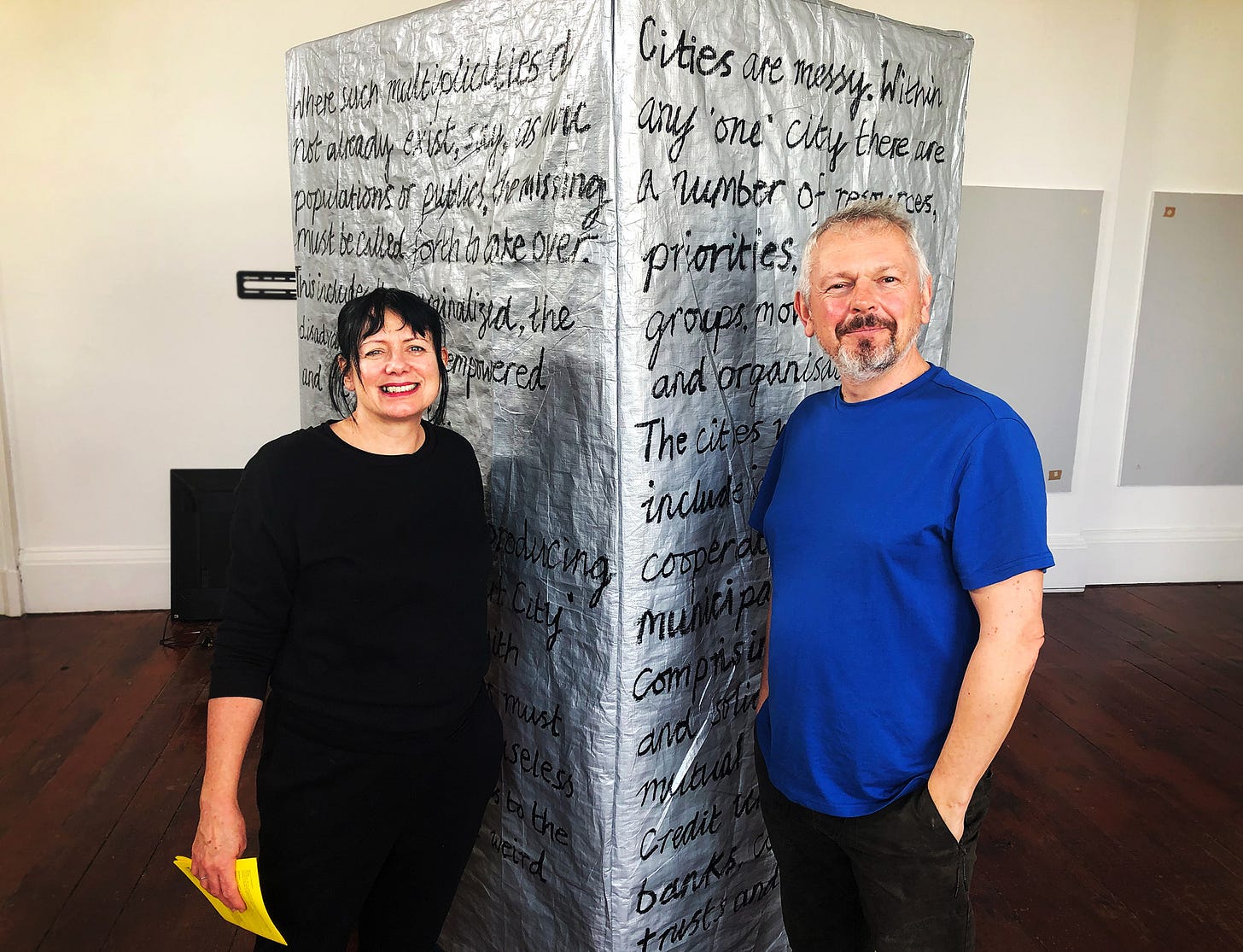
At first glance, William Thompson may seem very much like a 21st century man. Born in Cork city, he was a vegetarian, a feminist, an egalitarian educational reformer.
But he was born in 1778.
Centuries ahead of his time, Thompson’s writings on economy and social reform have had far-reaching but barely acknowledged impacts, inspiring the work of Karl Marx and Friedrich Engels and through their ideas, continuing to resonate and rebound around our post-cold-war geopolitical landscape.
“Thompson does a lot of things but one of the things he does is talk about surplus value, for the first time, we think,” Mel Jordan tells Tripe + Drisheen.
The concept of surplus value - the excess of value added through labour, over and above what people are paid for their work - makes its first appearance in Thompson’s 1824 book, An Inquiry into the Principals of the Distribution of Wealth Most Conducive to Human Happiness; applied to the Newly Proposed System of Voluntary Equality of Wealth.
“Marx reads that book, The Inquiry, in the 1860s when he’s in Manchester, in the Library.” Mel says. “And then he identifies and expands this idea of surplus value.”
The rest is history, and Marx’s role in penning Das Kapital and The Communist Manifesto was to have vast repercussions for the social order of our world, including, arguably, right up to the increasingly polarised “culture wars” era we now find ourselves in.
In an Irish context, Thompson’s writing also inspired James Connolly, who devoted a chapter of his book, Labour in Irish History, to Thompson’s ideas.
UK artists Mel Jordan and Andy Hewitt, founders of a loose artistic collective called Partisan Social Club, have been in Sirius Arts Centre in Cobh to install their William Thompson inspired exhibition, Talk to the Land.
Thompson was born in Cork city to a wealthy and powerful Anglo-Irish family, the only male heir to Alderman John Thompson, who became Lord Mayor of Cork while William was in his teens.
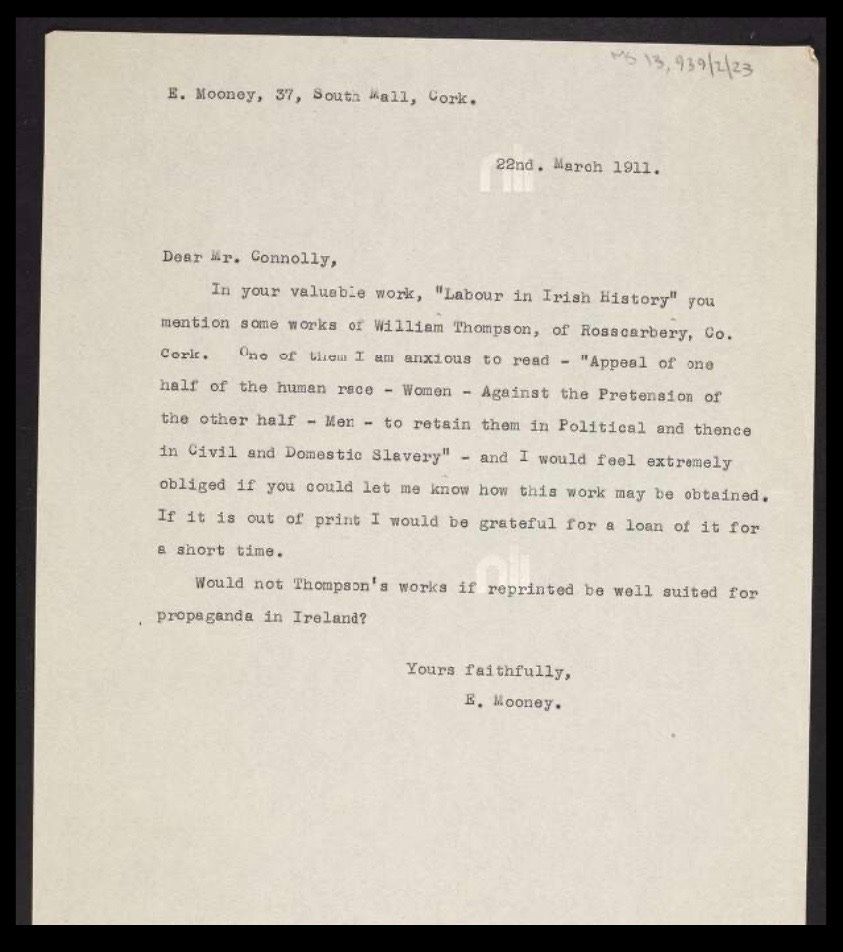
William Thompson penned five books with lengthy titles and became involved with the burgeoning co-operativist movement in England. Thompson was a Utilitarian, a believer in “the greatest good for the greatest number.”
With the British Empire seized in the grip of an industrial revolution that was moving people off the land and into cities, and benefiting a tiny number of industrialists at the expense of those whose bodily labour powered the mills and factories, he railed against what he saw as a “system of individual competition,” with everyone caught up in an illusory race for wealth and private property.
“He attacks the way of thinking about life solely through economy,” Mel says. “He was the first person in the English language to write about the idea of social science. He was going, ‘hang on, the way we think about society needs something else.’ He knew we needed to think about people and how they really live and relate to each other, rather than only the economics of it.”
He was also the first man to pen what can be regarded as a feminist text in the English language, when he co-wrote Appeal of One Half the Human Race, Women, Against the Pretentions of the Other Half, Men, to Retain Them in Political, and thence in Civil and Domestic Slavery with Anna Doyle Wheeler in 1825.
Thompson took his beliefs to extraordinary personal lengths towards the end of his life when, in 1829, inspired by Welsh man Robert Owen’s co-operative community, he tried to found a model commune in Carhoogariff, between Glandore and Leap in West Cork.
Thompson believed tenants at his 1,400 acre farm at Carhoogariff should pay fair rents and receive adequate rewards for their labour. He gave them allotments to grow their own food, built cottages for farm workers and arranged schooling for their children.
But he would only live another four years after this living experiment began: he died in 1833, at the age of just 57.
Thompson took his “Newly Proposed System of Voluntary Equality of Wealth” quite literally and divided up his estate in a manner that would have been profoundly shocking and distasteful to Cork’s wealthy merchant class: with no direct heirs, he bequeathed his estate to the co-operativist movement, making some provision for the re-printing of his books.
Isn’t one of the biggest conundrums when it comes to social change in favour of egalitarian distribution that those best served by the status quo are the ones most violently averse to altering it, while those most at the mercy of the cruellest elements of the capitalist system are the ones with nothing to lose in changing it?
Thompson’s sisters certainly did not want the status quo shaken when it came to his will: they immediately began a court battle to have his will annulled on the grounds that he was insane. The case dragged on for 25 years, the longest in Irish history at the time.
Today, not a trace remains of Thompson’s West Cork utopian experiment: Mel and Andy have been to look.
“Some scholars 30 years ago reported finding the remains of some cottages and a tower, which was said to be for Thompson,” Andy says. “When you go there now, there isn’t any concrete evidence of anything that might have happened. There’s nothing there.”
There is a memorial plaque to him near Carhoogariff, but Cork city doesn’t celebrate the memory of one of its most globally influential thinkers, nor even make any particular effort to commemorate him or showcase his writing. Even some of his books are completely unavailable, while others can be printed online and to order only.
“We contacted the Cork Archives and the library to try to find out more about him,” Mel says. “We know he had a house on Patrick Street, and maybe you could have a tour of Thompson around Cork: but there was nothing. The archivist even said to us, ‘if you find anything. could you let us know?’”
“Misery in the midst of all the means of happiness”
The failings of various attempts at communist systems and the misery inflicted around the world by the historically polarised battle between capitalism and communism are obvious.
But Thompson’s prediction that the unequal distribution of resources in a competitive capitalist system would ultimately lead to “misery in the midst of all the means of happiness” is now writ large, everywhere we look. Homelessness, addiction, mental ill health and social isolation are forming an ever bigger part of our cityscape.
Mel and Andy’s exhibition in Cobh tries to imagine what Thompson’s worries and preoccupations would have been today, and the result is very timely in a Cork context: Partisan Social Club’s attempts to “reimagine social relationships beyond privatisation and austerity” seem particularly relevant to the re-imagining of Cork city happening today.
The €353 million Cork City Docklands Project announced last year: will it serve the needs of all and be rooted in the provision of space and services to serve a community, or will it be yet more glassy office blocks, unaffordable apartments and businesses inaccessible to those without money?
In fact, Tripe + Drisheen’s entire Our Cork 2040 series that we ran last year attempted to grapple with the notion reflected in the text below:
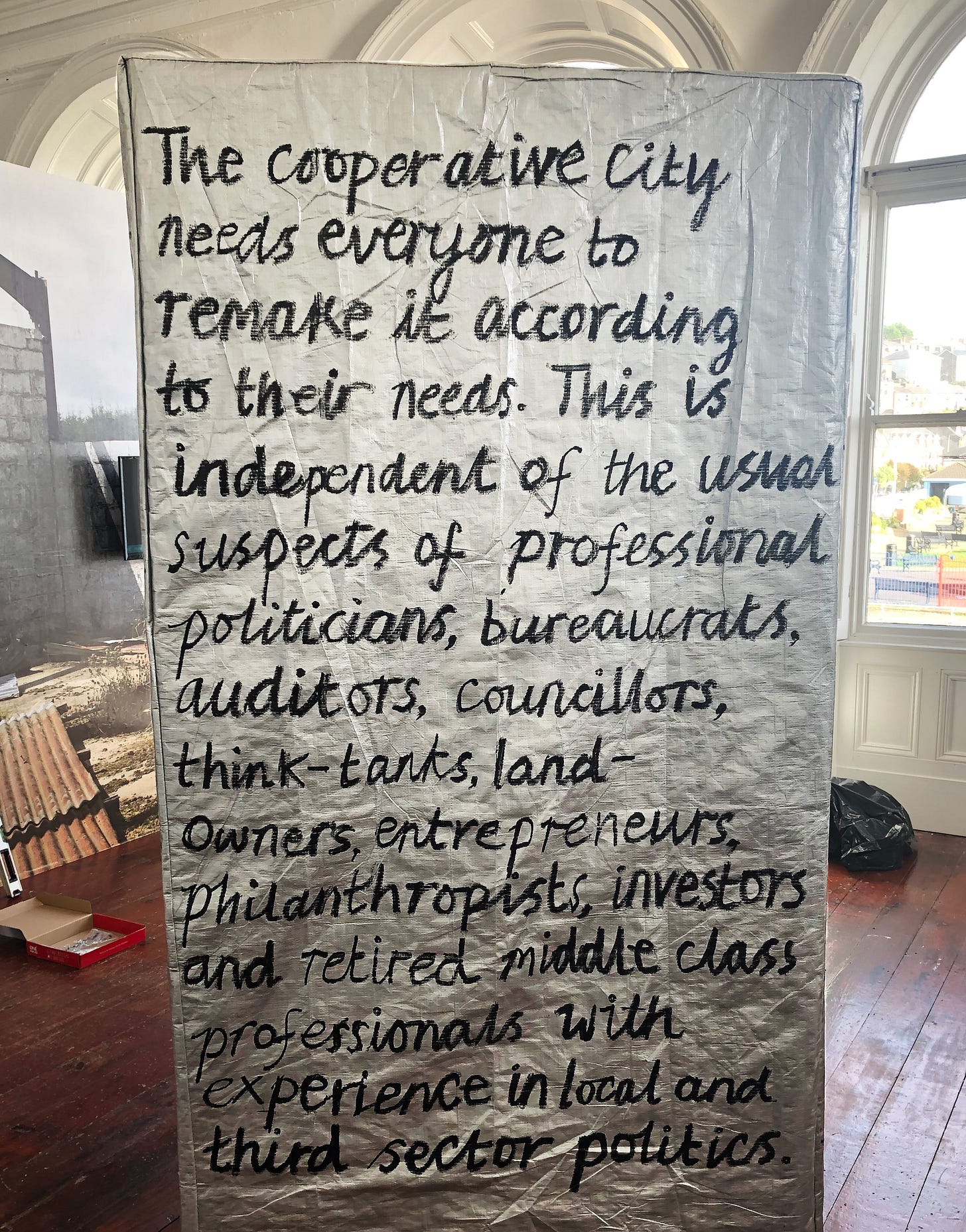
Writing and words are central to Talk to the Land and to Partisan Social Club’s broader modus operandi: a selection of football scarves emblazoned with slogans relating to housing form part of the exhibition.
“We use texts a great deal, which maybe comes out of 1960s conceptualism to an extent,” Andy says. “We’re interested in the potential of language to ask questions in the art gallery about who the publics of art are, about the world. Often we work around a text and that’s partly why we have enjoyed Thompson so much, because he wrote so much. We can generate new ideas from Thompson.”
“There’s a sense of internationalism in him: he was a wonderful trouble-causer of the time, and someone who was trying to think differently. He always questioned his own subjectivity. He was doing everything to ask questions of his own responsibility, and his background, which was, of course, Anglo-Irish, which came with its own set of problems.”
“We admire his courage.”
Partisan Social Club | Talk to the Land is on at Sirius Arts Centre in Cobh until February 18, 2023. More info here.




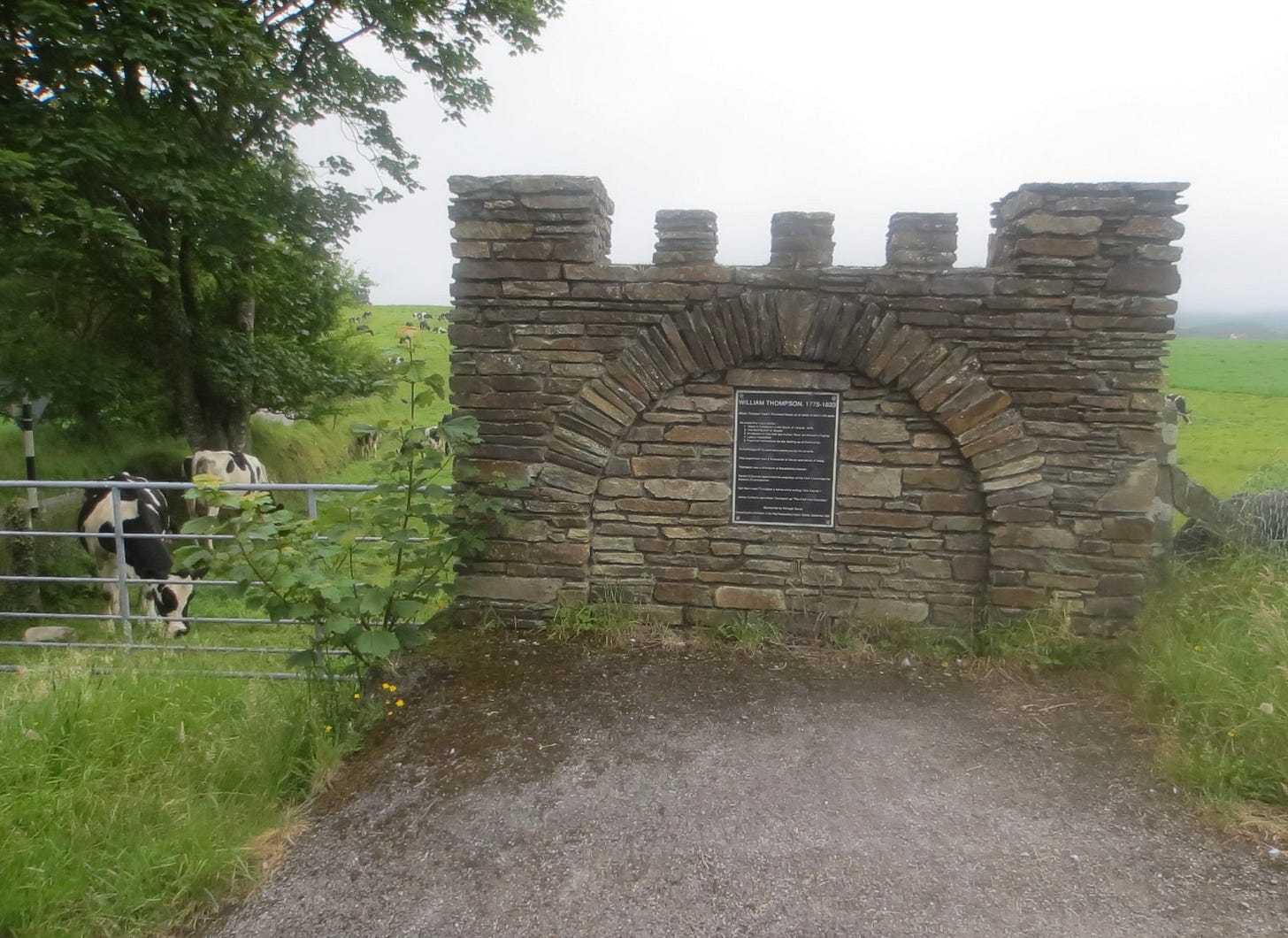

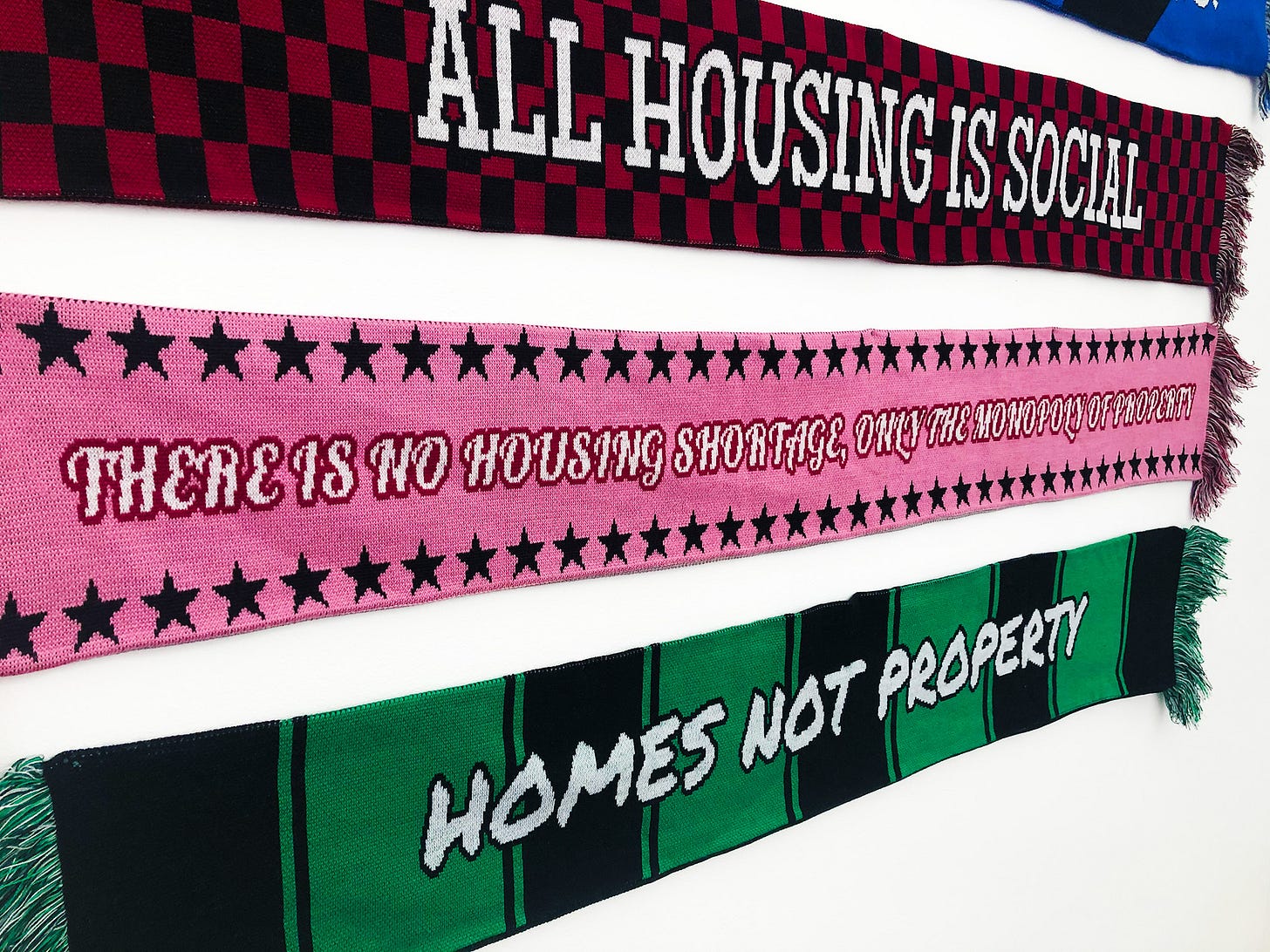
Very interesting !